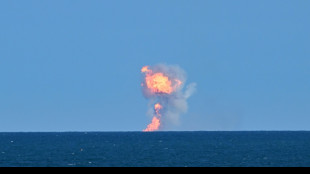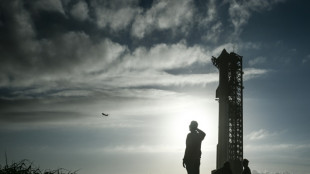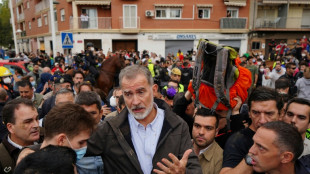
-
 Magritte painting nets auction record of $121 million
Magritte painting nets auction record of $121 million
-
Markets fluctuate as traders weigh geopolitical tensions

-
 Japanese, Koreans bottom of global love life survey
Japanese, Koreans bottom of global love life survey
-
Japan ramps up tech ambitions with $65 bn for AI, chips

-
 Taliban govt clearing 'un-Islamic' books from Afghanistan shelves
Taliban govt clearing 'un-Islamic' books from Afghanistan shelves
-
Asian markets struggle as traders weigh geopolitical tensions

-
 Iraq holds its first census in nearly 40 years
Iraq holds its first census in nearly 40 years
-
SpaceX fails to repeat Starship booster catch, as Trump watches on

-
 European powers, US seek to censure Iran at UN nuclear watchdog board
European powers, US seek to censure Iran at UN nuclear watchdog board
-
SpaceX fails to repeat Starship booster catch, as Trump looks on

-
 European stocks fall on Ukraine-Russia fears, US focused on earnings
European stocks fall on Ukraine-Russia fears, US focused on earnings
-
Trump names China hawk Howard Lutnick commerce secretary

-
 SpaceX set for Starship's next flight -- with Trump watching
SpaceX set for Starship's next flight -- with Trump watching
-
Top-selling daily French daily Ouest-France stops posting on X

-
 Russian invasion toll on environment $71 billion, Ukraine says
Russian invasion toll on environment $71 billion, Ukraine says
-
New Botswana leader eyes cannabis, sunshine to lift economy

-
 China's Xi urges 'strategic' ties in talks with Germany's Scholz
China's Xi urges 'strategic' ties in talks with Germany's Scholz
-
COP29 negotiators strive for deal after G20 'marching orders'

-
 Walmart lifts full-year forecast after strong Q3
Walmart lifts full-year forecast after strong Q3
-
Son of Norwegian princess arrested on suspicion of rape

-
 US lawmaker accuses Azerbaijan in near 'assault' at COP29
US lawmaker accuses Azerbaijan in near 'assault' at COP29
-
Spain royals to visit flood epicentre after chaotic trip: media

-
 French farmers step up protests against EU-Mercosur deal
French farmers step up protests against EU-Mercosur deal
-
Burst dike leaves Filipino farmers under water

-
 Markets rally after US bounce as Nvidia comes into focus
Markets rally after US bounce as Nvidia comes into focus
-
Crisis-hit Thyssenkrupp books another hefty annual loss

-
 Farmers descend on London to overturn inheritance tax change
Farmers descend on London to overturn inheritance tax change
-
Floods strike thousands of houses in northern Philippines

-
 SpaceX set for Starship's next flight, Trump expected to attend
SpaceX set for Starship's next flight, Trump expected to attend
-
Several children injured in car crash at central China school

-
 Urban mosquito sparks malaria surge in East Africa
Urban mosquito sparks malaria surge in East Africa
-
Many children injured after car crashes at central China school: state media

-
 Asian markets rally after US bounce as Nvidia comes into focus
Asian markets rally after US bounce as Nvidia comes into focus
-
Tens of thousands march in New Zealand Maori rights protest

-
 Five takeaways from the G20 summit in Rio
Five takeaways from the G20 summit in Rio
-
Parts of Great Barrier Reef suffer highest coral mortality on record

-
 Defiant Lebanese harvest olives in the shadow of war
Defiant Lebanese harvest olives in the shadow of war
-
Divided G20 fails to agree on climate, Ukraine

-
 Can the Trump-Musk 'bromance' last?
Can the Trump-Musk 'bromance' last?
-
US to call for Google to sell Chrome browser: report

-
 Trump expected to attend next Starship rocket launch: reports
Trump expected to attend next Starship rocket launch: reports
-
Stocks, dollar hesitant as traders brace for Nvidia earnings

-
 Biden in 'historic' pledge for poor nations ahead of Trump return
Biden in 'historic' pledge for poor nations ahead of Trump return
-
Tropical storm Sara kills four in Honduras and Nicaragua

-
 Spanish resort to ban new holiday flats in 43 neighbourhoods
Spanish resort to ban new holiday flats in 43 neighbourhoods
-
Phone documentary details Afghan women's struggle under Taliban govt

-
 G20 wrestles with wars, 'turbulence' in run-up to Trump
G20 wrestles with wars, 'turbulence' in run-up to Trump
-
Stocks, dollar hesitant as traders eye US rate outlook, Nvidia

-
 G20 wrestles with wars, climate in run-up to Trump
G20 wrestles with wars, climate in run-up to Trump
-
G20 host Brazil launches alliance to end 'scourge' of hunger


Conspiracy theories take off after global IT crash
From fearmongering about a looming "World War III" to false narratives linking a cabal of global elite to a cyberattack, a torrent of online conspiracy theories took off Friday after a major IT crash.
Airlines, banks, TV channels and financial institutions were engulfed in turmoil after the crash, one of the biggest in recent years that was the result of a faulty software update to an antivirus program operating on Microsoft Windows.
The proliferation of internet-breaking conspiracy theories on social media platforms -- many of which have removed guardrails that once contained the spread of misinformation -- illustrates the new normal of information chaos after a major world event.
The outage gave way to a swirl of evidence-free posts on X, the Elon Musk-owned site formerly known as Twitter, that peddled an apocalyptic narrative: The world was under attack by a nefarious force.
"I read somewhere once that ww3 (World War III) would be mostly a cyber war," one user wrote on X.
The IT crash also stirred up an unfounded theory that the World Economic Forum -- long a magnet for wild falsehoods -- had plotted a global cyberattack.
To make that theory appear credible, many posts linked an old WEF video that warned about the possibility of a "cyberattack with Covid-like characteristics."
The video, available on the WEF's website, had cautioned that the only way to stop the exponential spread of the cyber threat would be to disconnect millions of vulnerable devices from each other and the internet.
- 'Sad testament' -
The WEF has long been a target for conspiracy theorists pushing the idea of a shadowy cabal of elites working for private gain under the garb of solving global issues.
Also gaining rapid traction online were conspiratorial posts using the hashtag "cyber polygon," a reference to a global training event aimed at preparing for potential future attacks.
"The proliferation of conspiracy theories in the wake of major global events such as the outage is a sad testament to the volatile nature of the information ecosystem," Rafi Mendelsohn, vice president at the disinformation security company Cyabra, told AFP.
"What is unique to events like these is how social media platforms, forums, and messaging apps facilitate the rapid dissemination of content, allowing theories to gain traction quickly and reach a global audience."
The trend demonstrates the ability of falsehoods to mutate into viral narratives on tech platforms, which have scaled back content moderation and reinstated accounts that are known purveyors of misinformation.
During fast-developing news events, confusion now often reigns on major tech platforms, with users scrambling to obtain accurate information in what appears to be a sea of false or misleading posts that rapidly gain traction.
- 'Nefarious motives' -
"This poses the larger question of combatting mis- and disinformation," Michael W. Mosser, executive director of the Global Disinformation Lab at the University of Texas at Austin, told AFP.
"The level of trust that is required to accept information from reputable sources has declined to such an extent that people are more willing to believe wild conspiracies that 'must be true' rather than the factual information relayed to them."
The global outage, which brought myriad aspects of daily life to a standstill and sent US stocks falling, was linked to a bug in an update to an antivirus program for Windows systems from American cybersecurity group CrowdStrike.
Assurances by the Austin-based company's chief executive, George Kurtz, that CrowdStrike had rolled out a fix and was "actively working" to resolve the crisis did little to stem the spread of online conspiracies.
"Combatting this misinformation with factual rebuttals is difficult, because the issue is so technical," Mosser said.
"Explaining that the fault was in an improperly configured system file and that a fix is in process may be accurate, but it is not believed by those who are predisposed to see nefarious motives behind failures."
burs-ac/acb
Y.Ibrahim--CPN
